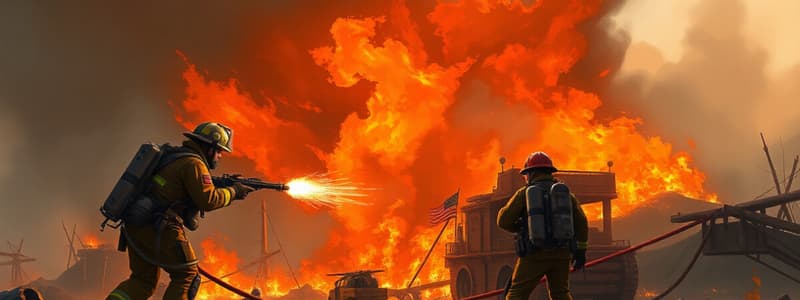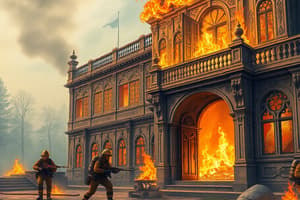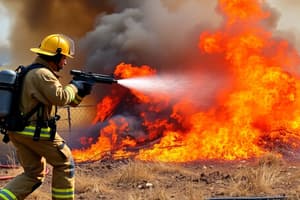Podcast
Questions and Answers
What primary factor does the Incident Commander consider when choosing the fireground strategy?
What primary factor does the Incident Commander consider when choosing the fireground strategy?
- The structural integrity and condition of the building (correct)
- The availability of firefighting resources
- Weather conditions in the area
- The presence of other emergency services
What is the potential danger of using both Offensive and Defensive strategies at the same fire scene?
What is the potential danger of using both Offensive and Defensive strategies at the same fire scene?
- Failure to establish a clear incident command
- Increased risk of injury or death to interior crews (correct)
- Confusion among command personnel
- Insufficient water supply for fire control
How must the fireground strategy be managed throughout the incident?
How must the fireground strategy be managed throughout the incident?
- It should remain static until the fire is completely extinguished
- It should only be changed if there are available resources
- It must be monitored and evaluated constantly (correct)
- It must be communicated only during shift changes
Which benchmark can influence a change in the fireground strategy according to the guidelines?
Which benchmark can influence a change in the fireground strategy according to the guidelines?
What should the initial Incident Commander include in the on-scene report?
What should the initial Incident Commander include in the on-scene report?
What is the primary focus of an Offensive Fire Attack according to the fireground strategy?
What is the primary focus of an Offensive Fire Attack according to the fireground strategy?
What must be determined before initiating an Offensive Fire Attack?
What must be determined before initiating an Offensive Fire Attack?
Which factor is NOT considered critical by Command when assessing fire conditions?
Which factor is NOT considered critical by Command when assessing fire conditions?
The guidelines for offensive fire attacks emphasize the importance of evaluating what?
The guidelines for offensive fire attacks emphasize the importance of evaluating what?
What is the main challenge for Command while managing a fireground scenario?
What is the main challenge for Command while managing a fireground scenario?
What is the role of the IRIC team in an Offensive Fire Attack?
What is the role of the IRIC team in an Offensive Fire Attack?
According to the guidelines for fire operations, what is critical to understanding fire behavior?
According to the guidelines for fire operations, what is critical to understanding fire behavior?
What should be done when heavy smoke is forced from a building under pressure and conditions are marginal?
What should be done when heavy smoke is forced from a building under pressure and conditions are marginal?
When is a change from an offensive to a defensive strategy typically announced?
When is a change from an offensive to a defensive strategy typically announced?
What is the first priority during defensive operations?
What is the first priority during defensive operations?
What action should be taken if retreat is delayed because of hose lines during a change to a defensive strategy?
What action should be taken if retreat is delayed because of hose lines during a change to a defensive strategy?
What is required after switching from an offensive to a defensive strategy?
What is required after switching from an offensive to a defensive strategy?
What is necessary before declaring a fire under control?
What is necessary before declaring a fire under control?
What is considered paramount when dealing with concealed space fires?
What is considered paramount when dealing with concealed space fires?
What should command do to ensure successful fire attack coordination?
What should command do to ensure successful fire attack coordination?
What can result from failing to address all 7 sides of a fire?
What can result from failing to address all 7 sides of a fire?
In marginal fire situations, what is the primary reason to operate?
In marginal fire situations, what is the primary reason to operate?
When should command abandon marginal attacks?
When should command abandon marginal attacks?
What is a major variable in attack operations during a fire situation?
What is a major variable in attack operations during a fire situation?
What should command consider about the fire's location during the attack?
What should command consider about the fire's location during the attack?
What type of attack strategy may need constant evaluation in marginal situations?
What type of attack strategy may need constant evaluation in marginal situations?
When addressing concealed spaces, what action must be prioritized?
When addressing concealed spaces, what action must be prioritized?
Flashcards are hidden until you start studying
Study Notes
Fireground Strategy
- The Incident Commander determines the fireground strategy based on a Risk Management Plan.
- Two strategies are employed: Offensive and Defensive.
- The Incident Commander must ensure all personnel operate within the chosen strategy.
- Avoiding simultaneous Offensive and Defensive strategies in the same fire area is crucial.
- The chosen strategy should match the fire conditions of the structure and minimize risk to firefighters.
- The initial Incident Commander includes the fireground strategy in the on-scene report.
- The fireground strategy provides a starting point for fireground operations.
- Everyone operating on the fireground must be operating in the same strategy mode.
- The strategy can change with conditions or as benchmarks are obtained.
Offensive Attack
- The structure must be determined safe to enter before an Offensive Fire Attack.
- Offensive Fire Attack is centered on RESCUE.
- The first attack line must go between the victims and the fire to protect avenues of rescue and escape.
- It’s important to determine fire conditions and extent before starting fire operations.
- The unburned portion helps predict fire spread.
- Command must consider the most critical direction and avenues of fire extension, its speed, and its effects on:
- Rescue activities
- Level of risk to firefighters
- Confinement efforts
- Exposure protection
- Command allocates personnel and resources based on fire spread evaluation.
- Attack efforts must be fast, strong, and well-placed.
- Command must consider the 7 sides (or sectors) of the fire: front, rear, both sides, top, bottom, and interior.
- Fires are not under control until all 7 sides are addressed.
- During concealed space fires, companies must open up and operate fire streams into these areas.
- Early ventilation is a major support item that must be addressed during concealed space attacks.
- Command must consider where the fire will be when attack efforts are ready to go into operation.
- Command must write-off property already lost and protect exposed property based on the most dangerous direction of fire spread.
Marginal Attack
- Offensive/defensive conditions are sometimes clearly defined.
- In marginal situations, Command initiates an offensive interior attack while setting up defensive positions on the exterior.
- The effect of the interior attack must be constantly evaluated.
- Command abandons marginal attacks when:
- A primary all clear is obtained and the situation is still marginal.
- The roof is unsafe or untenable.
- Interior forces encounter heavy heat and cannot locate the fire or make progress.
- Heavy smoke is being forced from the building under pressure and is increasing.
- Roof Sector assignment is crucial in marginal situations for rapid evaluation of roof conditions.
- It is better to go from an offensive to a defensive strategy too soon rather than too late.
Defensive Attack
- The decision to operate defensively indicates that the offensive strategy has been abandoned.
- The involved structure has been conceded as lost.
- The announcement of a change to a defensive strategy is Emergency Traffic.
- All personnel withdraw from the structure while maintaining a safe distance.
- Company Officers/Acting Company Officers account for their crews.
- Sector Officers notify Command of the status of assigned crews.
- Interior lines are withdrawn and repositioned when changing to a defensive strategy.
- Retreat with hose lines is prioritized if safe, otherwise they should be abandoned.
- Exposure protection is the first priority in defensive operations, followed by personnel safety.
- Master streams are generally the most effective tactic in defensive operations.
- Exposure protection is established before knocking down the main body of fire.
- Fire under control means the forward progress of the fire has been stopped and remaining fire can be extinguished with on-scene resources.
- Command notifies dispatch when the fire is under control utilizing a standard radio report.
- A PAR report is initiated from all on-scene sectors and crews.
- If defensive operations are conducted from the onset of the incident, Command will notify dispatch that there will not be a primary search completed.
Studying That Suits You
Use AI to generate personalized quizzes and flashcards to suit your learning preferences.




